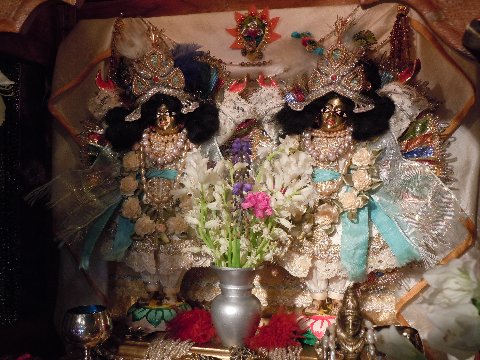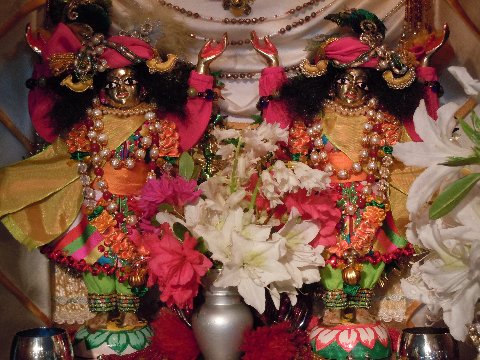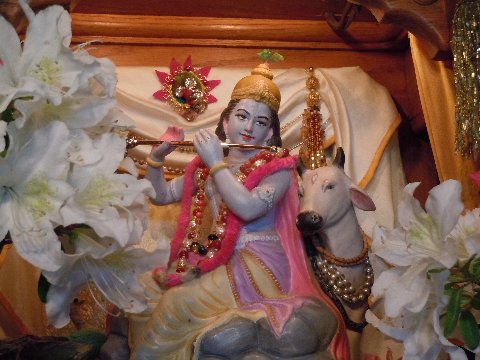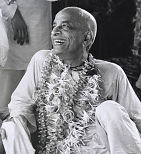Various Grades of Bhakti Nāradīya Purāṇa 1.15.38-51
viṣṇau samarpitaṁ sarvaṁ sāttvikaṁ saphalaṁ bhavet
hari-bhakti parā nṝṇāṁ sarva-pāpa-praṇāśinī
[Lord Vishnu, incarnated as Dharma, religiosity
personified, said to the
sagacious king Bhagirath:]
Everything dedicated to Lord Vishnu attains success
and goodness. It is transcendental devotion to Lord
Hari that is the destroyer of all sins of human beings.
sā bhaktir daśadhā jñeyā pāpāraṇya-davopamā
tāmasai rājasaiś caiva sāttvikaiś ca nṛpottama
O best among kings! That devotional service which
is like a great fire for a forest of sins is understood
to be divided into ten types according to [the broad
categories of] tāmasī-bhakti, devotion in the mode of
ignorance, rājasī-bhakti, devotion in the mode of passion,
and sāttvikī-bhakti, devotion in the mode of goodness.
[Translator’s Note: These ten categories are as follows:
(9) uttamā-sāttvikī-bhakti, superior devotion in the
material mode of
goodness;
(10) uttamottamā-bhakti, topmost devotion devoid
of the material
modes.]
yac cānyasya vināśārthaṁ bhajanaṁ śrī-pater nṛpa
sā tāmasy adhamā bhaktiḥ khala-bhāva-dharā yataḥ
O King! That devotional service towards the Lord
of Sri, Lakshmi, which is performed for revengefully
destroying someone, is known as adhamā-tāmasībhakti,
low-level devotion in the material mode of
ignorance, for it consists of rogue-like tendencies.
yo ’rcayet kaitava-dhiyā svairiṇī sva-patiṁ yathā
nārāyaṇaṁ jagannāthaṁ tāmasī madhyamā tu sā
One who worships Lord Jagannath, also known
as Narayan, with a deceitful heart, like an
unchaste wife worshiping her husband, performs
madhyamā-tāmasī-bhakti, intermediate devotion in
the material mode of ignorance.
deva-pūjā parān dṛṣṭvā mātsaryād yo ’rcayed dharim
sā bhaktiḥ pṛthivī-pāla tāmasī cottamā smṛtā
O maintainer of the earth! Seeing the demigod
worship of others, one who worships Lord Hari with
a feeling of competitive enviousness is understood
to be performing uttamā-tāmasī-bhakti, superior
devotion in the material mode of ignorance.
dhana-dhānyādikaṁ yas tu prārthayann arcayed dharim
śraddhayā parayā yuktaḥ sā rājasy adhamā smṛtā
Equipped with higher faith, one who worships Lord
Hari, praying for money and material resources, is
understood to be performing adhamā-rājasī-bhakti,
low-level devotion in the material mode of passion.
yaḥ sarva-loka-vikhyāta-kīrtim uddiśya mādhavam
arcayet parayā bhaktyā sā madhyā rājasī matā
Through higher devotion, one who worships Lord
Madhav while desiring material fame in all the worlds
is said to be performing madhyamā-rājasī-bhakti,
intermediate devotion in the material mode of passion.
sālokyādi padaṁ yas tu samuddiśyārcayed dharim
sā rājasy uttamā bhaktiḥ kīrtitā pṛthivī-pate
O Lord of the earth! One who worships Lord Hari
with a desire to attain liberation such as sālokya,
residing on the same planet as the Lord, is said to be
performing uttamā-rājasī-bhakti, superior devotion
in the material mode of passion.
yas tu sva-kṛta-pāpānāṁ kṣayārthaṁ prārcayed dharim
śraddhayā parayopetaḥ sā sāttviky adhamā smṛtā
Equipped with higher faith, one who worships
Lord Hari expertly only to diminish his sins is said
to be performing adhamā-sāttvikī-bhakti, low-level
devotion in the material mode of goodness.
harer idaṁ priyam iti suśrūṣāṁ kurute tu yaḥ
śraddhayā saṁyuto bhūyaḥ sāttvikī madhyamā tu sā
Equipped with faith, one who performs service
because he has heard [from
somewhere] that such
and such service is dear to Lord Hari [but does
not
apply much intellect and realization] is said to be
performing madhyamā-sāttvikī-bhakti, intermediate
devotion in the material mode of goodness.
vidhi-buddhyārcayed yas tu dāsavac chrī-patiṁ nṛpa
bhaktīnāṁ pravarā sā tu uttamā sāttvikī smṛtā
O King!, One who worships the Lord of Sri, Lakshmi,
like a servant, with an intelligence equipped with
scriptural rules and regulations, performs the
topmost type of devotion in the material modes,
known as uttamā-sāttvikī-bhakti, superior devotion
in the material mode of goodness.
mahimānaṁ harer yas tu kiñcit kṛtvā priyo naraḥ
tan mayatvena santuṣṭaḥ sā bhaktir uttamottamā
[Finally], knowing thoroughly the glories of Lord
Hari, that human who performs anything dear to Lord
Hari while being fully satisfied due to being absorbed
in spontaneous devotion is said to be performing
uttamottamā-bhakti, topmost devotion devoid of the
material modes.
aham eva paro viṣṇur mayi sarvam idaṁ jagat
iti yaḥ satataṁ paśyet taṁ vidyād uttamottamam
One who constantly realizes that I, Vishnu, am the only
transcendental Lord and that the entire world is resting
upon me, is to be known as the topmost [devotee].
evaṁ daśa-vidhā bhaktiḥ saṁsārac-cheda-kāriṇī
tatrāpi sattvikī bhaktiḥ sarva-kāma-phala-pradā
These are the ten types of devotion, [and any
one of them is] capable of destroying material
existence. Yet devotional service in the mode of
goodness is the one which can fulfill all of one’s
[material and
spiritual] desires.
— Translated by Hari Parshad Das from the Nāradīya-mahā-purāṇa
published by Khemraj Shrikrishna Das. Printed at the Venkateshwar
Steam Press, Mumbai. Vikram Samvat 1980 (~ 1923 A.D.)
More than the Lord
From the Prapannāmṛta of Sri Anantacharya
śrīmad-bhāgavatārcanaṁ bhagavataḥ pūjā-vidher uttamaṁ
śrī-viṣṇor avamānanād guru-taraṁ śrī-vaiṣṇavollaṅghanam
tīrthād acyuta-pādajād guru-taraṁ tīrthaṁ tadīyāṅghrijaṁ
tasmān nityam atandrito bhava satāṁ teṣāṁ samārādhane
The topmost form of worshiping the Supreme Lord
is the worship of his pure devotee. More dangerous
than defying Lord Vishnu is to defy a vaiṣṇava. More
potent than the water emanating from the Lord’s
feet is the water emanating from his dear devotee’s
lotus feet. Therefore always be alert and engage in
the dedicated worship of those devotees dear to the
Lord. (Chapter 65, verse 86.)
Translated by Hari Parshad Das from the Prapannāmṛta edited
by Srinivas Nrsimhacharya (Balaji Swami). Published by Khemraj
Shrikrishnadas. Printed at the Venkateshwar Steam Press, Mumbai.
Vikram Samvat 1964 (~ 1907 A.D.)
(The above information is taken from this Website: www.gopaljiu.org )
Now here is what Srila Prabhupada writes on pure devotional service.
SB 3.29.8 P Explanation of Devotional Service by Lord Kapila
To act under the direction of a bona fide spiritual master with a motive to satisfy the Supreme Personality of Godhead is pure devotional service. But if one has a motive for personal sense gratification, his devotional service is manifested
differently. Such a man may be violent, proud, envious and angry, and
his interests are separate from the Lord’s.
One who approaches the Supreme Lord to render devotional service,
but who is proud of his personality, envious of others or vengeful, is
in the mode of anger. He thinks that he is the best devotee.
Devotional service executed in this way is not pure; it is mixed and
is of the lowest grade, tamasah. Srila Visvanatha Cakravarti Thakura
advises that a Vaisnava who is not of good character should be
avoided. A Vaisnava is one who has taken the Supreme Personality of
Godhead as the ultimate goal of life, but if one is not pure and still
has motives, then he is not a Vaisnava of the first order of good
character. One may offer his respects to such a Vaisnava because he
has accepted the Supreme Lord as the ultimate goal of life, but one
should not keep company with a Vaisnava who is in the mode of
ignorance.
SB 10.10.20-22 P Deliverance of the Yamala-arjuna Trees
dvau bhuta-sargau loke ‘smin
daiva asura eva ca
visnu-bhaktah smrto daiva
asuras tad-viparyayah
Padma Purana)
The distinction between a pure devotee and a karma-misra devotee is
this: a pure devotee does not desire anything for material enjoyment,
whereas a mixed devotee becomes a devotee to become a first-class
enjoyer of this material world. One who is in direct touch with the
Supreme Personality of Godhead in devotional service remains pure,
uncontaminated by material desires (anyabhilasita-sunyam
jnana-karmady-anavrtam).
By karma-misra-bhakti one is elevated to the celestial kingdom, by
jnana-misra-bhakti one is able to merge in the Brahman effulgence, and
by yoga-misra-bhakti one is able to realize the omnipotency of the
Supreme Personality of Godhead. But pure bhakti does not depend on
karma, jnana or yoga, for it simply consists of loving affairs. The
liberation of the bhakta, therefore, which is called not just mukti
but vimukti, surpasses the five other kinds of liberation–sayujya,
sarupya, salokya, sarsti and samipya. A pure devotee always engages in
pure service (anukulyena krsnanusilanam bhaktir uttama). Taking birth
in the upper planetary system as a demigod is a chance to become a
further purified devotee and go back home, back to Godhead. Narada
Muni indirectly gave Manigriva and Nalakuvara the greatest opportunity
by his so-called curse.
The Bhakti-rasamrta-sindhu (1.1.11) defines pure
devotion thus:
anyabhilasita-sunyam
jnana-karmady-anavrtam
anukulyena krsnanu-
silanam bhaktir uttama
"One should render transcendental loving service to the Supreme
Lord Krsna favorably and without desire for material profit or gain
through fruitive activities or philosophical speculation. That is
called pure devotional service."
SB 4.20.25 My dear Lord, You are glorified by the selected verses uttered by
great personalities. Such glorification of Your lotus feet is just
like saffron particles. When the transcendental vibration from the
mouths of great devotees carries the aroma of the saffron dust of Your
lotus feet, the forgetful living entity gradually remembers his
eternal relationship with You. Devotees thus gradually come to the
right conclusion about the value of life. My dear Lord, I therefore do
not need any other benediction but the opportunity to hear from the
mouth of Your pure devotee.
Purport-… A pure devotee always engages in the service of the Lord, taking
shelter of His lotus feet, and therefore he has a direct connection
with the saffron mercy-particles that are strewn over the lotus feet
of the Lord. Although when a pure devotee speaks the articulation of
his voice may resemble the sound of this material sky, the voice is
spiritually very powerful because it touches the particles of saffron
dust on the lotus feet of the Lord. As soon as a sleeping living
entity hears the powerful voice emanating from the mouth of a pure
devotee, he immediately remembers his eternal relationship with the
Lord, although up until that moment he had forgotten everything.









